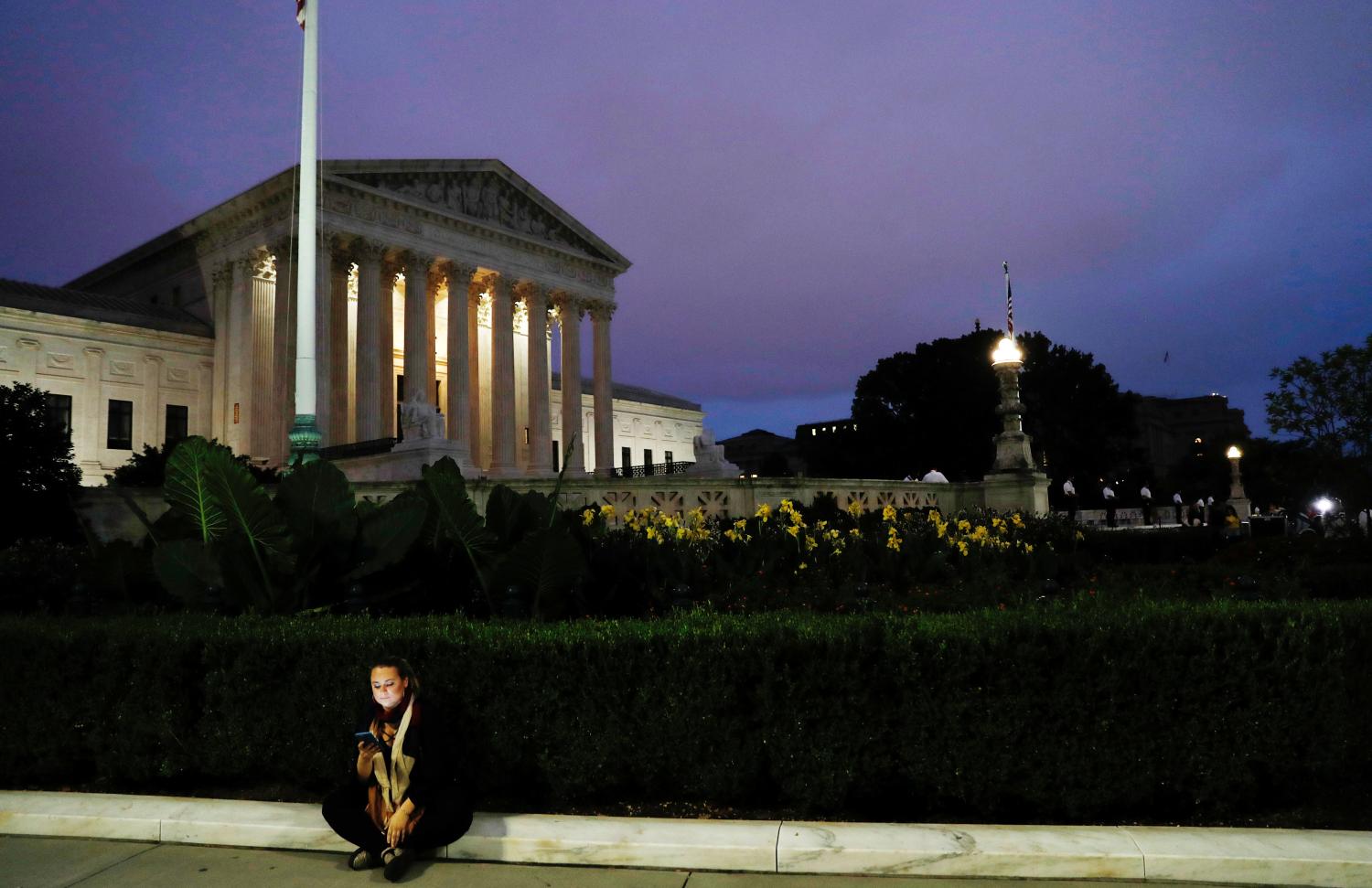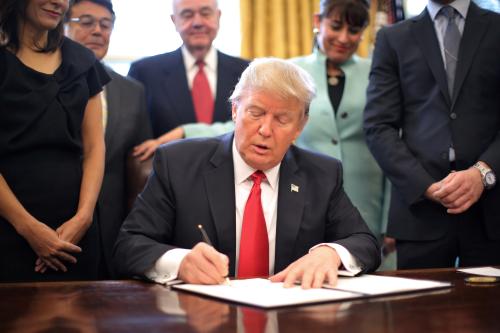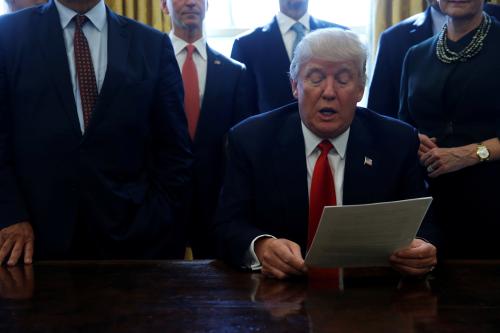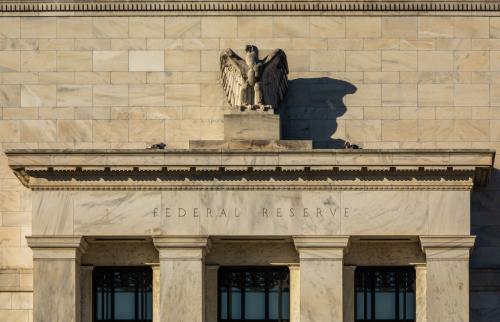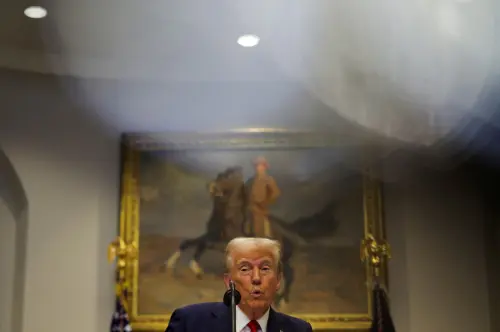This report is part of the Series on Regulatory Process and Perspective and was produced by the Brookings Center on Regulation and Markets.
The Trump administration has engaged in a well-publicized and wide ranging deregulatory campaign. As a key part of this effort, Trump-led agencies have delayed, modified, or repealed rules issued late in the Obama era. These deregulatory efforts have been tracked by Brookings and prior work in this Brookings series has analyzed their impact. This piece analyzes an important related issue: how has Trump-era deregulation fared when challenged in courts?
Trump era deregulation has prompted a number of legal challenges, largely on the grounds that agencies have not followed the procedures required to change rules. Most but not all of these challenges have been to EPA deregulatory efforts. Analysts on both the left and right ends of the political spectrum have agreed that the administration has fared poorly in the courts. This conventional wisdom is correct. According to a running tally of court challenges to Trump-era deregulatory rules, the administration has prevailed in one case and either lost or abandoned its position in 18 cases.1 This 5 percent “win rate” is far below the normal agency win rate, which averages 69 percent across eleven studies.2
This record should be put in context. According to the Brookings deregulation tracker, the administration has pursued at least 143 significant deregulatory actions (some of which are not easily challenged in court). Given the expense of challenging agency rules, it is likely that the most legally vulnerable were among the 19 challenged. Presumably some of the unchallenged deregulatory rules had a stronger legal basis. Still, the 5 percent “win rate” is quite low by any measure.
The short-term policy implications of these deregulatory losses are clear. The deregulatory initiatives successfully challenged will be halted (assuming all opportunities for legal appeal are exhausted or unused) and will require additional justification by the responsible agencies. In many of these cases, the EPA had dispensed with procedures such as explaining its reasoning and allowing the public an opportunity to comment. Professor Jonathan Adler has termed these “quick-and-dirty deregulatory efforts” put forth by inexperienced and perhaps impatient Trump officials uninterested in the nuances of the federal rulemaking process.
Because most of the cases were challenges to EPA deregulation, the policy implications will be felt in the realm of environmental policy. Many of these environmental policy issues are politically high-profile and economically important. Examples include deregulation of methane leaks to ozone pollution. Time will tell how the EPA responds to these court losses and whether it ultimately achieves its deregulatory objectives. In the case of methane gas leaks, the EPA has begun the process to do so.
Administrative law is somewhat unique in that precedents are created and shared by all agencies.
The longer-term legal implications are less clear. Administrative law is somewhat unique in that precedents are created and shared by all agencies. An administrative law decision in an EPA case could therefore be cited in an otherwise unrelated case from the Department of Health and Human Services. In this sense, administrative law is a “common pool” created by all agencies. It is therefore worth speculating as to whether the 18 Trump-era court losses will affect that common pool over the long-term. Put differently, are these cases likely to be cited against future agencies seeking to deregulate? Or, are these likely to be one-off cases that will soon be forgotten? In my view, the former outcome seems more likely. Two principles from the Trump era deregulatory cases to date appear likely to endure (additional principles from these cases are detailed here).
Indefinitely delaying a rule’s effective date can now be challenged in court
One key principle pertains to the ability of courts to review agency delays of the date on which rules take effect. As noted above, the Trump EPA delayed the date on which a number of rules issued late in the Obama administration took effect, including a rule to regulate methane emissions. These delays are often extremely important to deregulatory efforts because once a rule takes effect, regulated parties must invest significant resources in compliance. Once undertaken, these investments (sometimes termed “sunk costs”) may reduce the appetite of regulated parties to eliminate the rule. This may be especially true when the costs may serve as a barrier to new competitors or when the regulated parties must actually spend further resources to adapt to deregulation. These dynamics are less likely to matter for a new administration seeking to quickly bolster a regulatory policy adopted late in the prior administration. More stringent regulation is generally incremental to existing regulation, reducing the sunk cost problem. Moreover, a new administration that favors more stringent regulation is less likely to prefer removing the prior rule altogether (thereby leaving no regulation) while the more stringent rule is proposed and adopted.
The timing dynamics noted above make it all the more important for a deregulatory administration to ensure that the regulation never takes effect (they also make motions in litigation to stop a rule from taking effect particularly important). Because issuing a new deregulatory rule takes a long time, delaying the rule’s effective date is an attractive strategy to gain additional time to deregulate. In the extreme case, an indefinite delay may effectively kill a rule. The methane decision held squarely that such delays are subject to review by the courts (previously most such rule delays were sufficiently short – say 60 days – that they had expired before a court heard a challenge, rendering the case moot). The prospect of judicial review, particularly of longer delays of effective dates, will likely act as a deterrent to future administrations considering delays of rules issued by their predecessors.
Agencies must also explain and seek public comment on delays
A second key principle pertains to the public’s opportunity to comment on agency delays of rules. Several courts have held that before an agency delays the effective date of a rule, it must explain and seek public comment on its rationale for doing so. The requirement to seek public comment on rule delays is important, as it requires the agency to articulate its rationale for delay and respond to critiques of its reasoning. This public comment process also draws public attention to rule delays. Lastly, it increases the amount of work for the agency to delay the effective date, potentially making it less attractive.
In short, the Trump administration’s record defending deregulatory initiatives in court is not strong. The courts have clarified that agencies must generally explain and accept comment on their rationale for delaying rules. Courts may review such delays, making them less attractive to agency officials at the margins. None of this is to say that the Trump administration will be unable to achieve its deregulatory goals, but the courts have made clear that doing so will require more time and effort. Future administrations are likely to be held to the same standard.
The SEC disclaims responsibility for any private publication or statement of any SEC employee or Commissioner. The Article expresses the author’s views and does not necessarily reflect those of the Commission or other members of the staff.
The author did not receive any financial support from any firm or person for this article or from any firm or person with a financial or political interest in this article. He is currently not an officer, director, or board member of any organization with an interest in this article.
-
Footnotes
- This is the most comprehensive list of which I am aware. Even if the list is incomplete, I believe it provides an accurate portrayal of the overall picture.
- This result is also consistent with a preliminary study that focused exclusively on challenges to agency rulemakings as opposed to including challenges to other types of agency actions.
The Brookings Institution is committed to quality, independence, and impact.
We are supported by a diverse array of funders. In line with our values and policies, each Brookings publication represents the sole views of its author(s).

